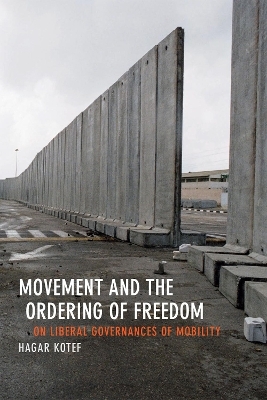
Movement and the Ordering of Freedom
On Liberal Governances of Mobility
Seiten
2015
Duke University Press (Verlag)
978-0-8223-5843-5 (ISBN)
Duke University Press (Verlag)
978-0-8223-5843-5 (ISBN)
Examines the roles of mobility and immobility in the history of political thought and the structuring of political spaces.
We live within political systems that increasingly seek to control movement, organized around both the desire and ability to determine who is permitted to enter what sorts of spaces, from gated communities to nation-states. In Movement and the Ordering of Freedom, Hagar Kotef examines the roles of mobility and immobility in the history of political thought and the structuring of political spaces. Ranging from the writings of Locke, Hobbes, and Mill to the sophisticated technologies of control that circumscribe the lives of Palestinians in the Occupied West Bank, this book shows how concepts of freedom, security, and violence take form and find justification via “regimes of movement.” Kotef traces contemporary structures of global (im)mobility and resistance to the schism in liberal political theory, which embodied the idea of “liberty” in movement while simultaneously regulating mobility according to a racial, classed, and gendered matrix of exclusions.
We live within political systems that increasingly seek to control movement, organized around both the desire and ability to determine who is permitted to enter what sorts of spaces, from gated communities to nation-states. In Movement and the Ordering of Freedom, Hagar Kotef examines the roles of mobility and immobility in the history of political thought and the structuring of political spaces. Ranging from the writings of Locke, Hobbes, and Mill to the sophisticated technologies of control that circumscribe the lives of Palestinians in the Occupied West Bank, this book shows how concepts of freedom, security, and violence take form and find justification via “regimes of movement.” Kotef traces contemporary structures of global (im)mobility and resistance to the schism in liberal political theory, which embodied the idea of “liberty” in movement while simultaneously regulating mobility according to a racial, classed, and gendered matrix of exclusions.
Hagar Kotef is based at the Minerva Humanities Center at Tel Aviv University.
Preface vii
Acknowledgments xi
Introduction 1
1. Between Imaginary Lines: Violence and Its Justifications at the Military Checkpoints in Occupied Palestine / Hagar Kotef and Merav Amir 27
2. An Interlude: A Tale of Two Roads—On Freedom and Movement 52
3. The Fence That "Ill Deserves the Name of Confinement": Locomotion and the Liberal Body 61
4. The Problem of "Excessive" Movement 87
5. The "Substance and Meaning of All Things Political": On Other Bodies 112
Conclusion 136
Notes 141
Bibliography 203
Index 217
| Erscheint lt. Verlag | 6.3.2015 |
|---|---|
| Reihe/Serie | Perverse Modernities: A Series Edited by Jack Halberstam and Lisa Lowe |
| Zusatzinfo | 12 illustrations |
| Verlagsort | North Carolina |
| Sprache | englisch |
| Maße | 152 x 229 mm |
| Gewicht | 463 g |
| Themenwelt | Geisteswissenschaften ► Geschichte ► Regional- / Ländergeschichte |
| Geisteswissenschaften ► Philosophie | |
| Sozialwissenschaften ► Politik / Verwaltung ► Politische Theorie | |
| ISBN-10 | 0-8223-5843-3 / 0822358433 |
| ISBN-13 | 978-0-8223-5843-5 / 9780822358435 |
| Zustand | Neuware |
| Haben Sie eine Frage zum Produkt? |
Mehr entdecken
aus dem Bereich
aus dem Bereich
Erinnerungen
Buch | Softcover (2024)
Pantheon (Verlag)
16,00 €
Universalgelehrter, Polarreisender, Entdecker
Buch | Hardcover (2024)
mareverlag
28,00 €


